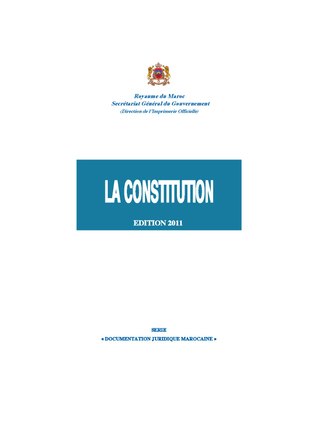
A popular initiative is a form of direct democracy by which a petition meeting certain hurdles can force a legal procedure on a proposition.
A constitutional amendment is a modification of the constitution of a polity, organization or other type of entity. Amendments are often interwoven into the relevant sections of an existing constitution, directly altering the text. Conversely, they can be appended to the constitution as supplemental additions, thus changing the frame of government without altering the existing text of the document.
In Australia, referendums are public votes held on important issues where the electorate may approve or reject a certain proposal. In contemporary usage, polls conducted on non-constitutional issues are known as plebiscites, with the term referendum being reserved solely for votes on constitutional changes, which is legally required to make a change to the Constitution of Australia.

Elections in Niger take place within the framework of a semi-presidential system. The President and National Assembly are elected by the public, with elections organised by the Independent National Electoral Commission (CENI).

A constitutional referendum was held in France on 21 October 1945. Voters were asked whether they approved of the Assembly elected on the same day serving as a Constituent Assembly, and whether until a new constitution was approved, the country would be governed according to a proposed set of laws that appeared on the ballot paper. If the first proposal had not been approved, the Third Republic would have been restored, but its approval led to the elected Assembly drafting a constitution and proposing it to the people a year later, resulting in the creation of the Fourth Republic. Both were approved by wide margins with a turnout of 79.8%.

A constitutional referendum was held in France on 5 May 1946. Voters were asked whether they approved of a new draft Constitution proposed by the Constituent Assembly elected in 1945.

A constitutional referendum was held in France on 13 October 1946. Voters were asked whether they approved of a new constitution proposed by the Constituent Assembly elected in June. Unlike the May referendum, which saw a previous constitutional proposal rejected, the new Constitution of 27 October 1946 was accepted by 53% of voters, and brought the Fourth Republic into existence. Voter turnout was 68%.

A constitutional referendum was held in France on 28 September 1958. Voters were asked whether they approved of the adoption of a constitution for the French Fifth Republic written by Charles de Gaulle. It was overwhelmingly approved, with 82.6% in favour. Voter turnout was 84.9% in metropolitan France and 79.8% overall.

A popular referendum, depending on jurisdiction also known as a citizens' veto, people's veto, veto referendum, citizen referendum, abrogative referendum, rejective referendum, suspensive referendum, and statute referendum, is a type of a referendum that provides a means by which a petition signed by a certain minimum number of registered voters can force a public vote (plebiscite) on an existing statute, constitutional amendment, charter amendment, or ordinance; in its minimal form, it simply obliges the executive or legislative bodies to consider the subject by submitting it to the order of the day. It is a form of direct democracy.

Proposition 7 of 1911 was an amendment of the Constitution of California that introduced, for the first time, the initiative and the optional referendum. Prior to 1911 the only form of direct democracy in California was the compulsory referendum.

The Constitution of Morocco is the supreme law of the Kingdom of Morocco. The constitution defines Morocco as a constitutional monarchy and lays out the fundamental rights of Moroccan citizens, it also defines the basis and structures of government, the council of ministers, and the parliament.
A non-binding constitutional referendum was held in Iceland on 20 October 2012. As a part of the 2010–2013 constitutional reform, and upon recommendation by the Constitutional Assembly, voters were asked whether they approved of six proposals included in a new draft constitution of Iceland. All six questions were approved by voters. The passing of Question 3 regarding the inclusion of a national church in the constitution was the only provision that went against the Constitutional Assembly's recommendations.
A referendum is a direct vote in which an entire electorate is asked to either accept or reject a particular proposal. This article summarises referendum laws and practice in various countries.

The constitution of the French Fifth Republic allows three types of referendum:
- At the national level, a legislative referendum on the initiative of President of the French Republic on a proposal by the Cabinet or the Parliament ;
- Locally, a local referendum initiative.
- The Constitutional Law of 23 July 2008 provides a shared initiative referendum.
A constitutional referendum was held in French Gabon and Moyen Congo on 13 October 1946 as part of the wider French constitutional referendum. Although the proposed new constitution was rejected by 72% of voters in the territory, it was approved by 53% of voters overall.
A constitutional referendum was held in Chad and Ubangi-Shari on 13 October 1946 as part of the wider French constitutional referendum. The proposed new constitution was rejected by 77% of voters, with a turnout of 64%. However, the constitution was approved by a majority of voters in the overall results.

A constitutional referendum was held in Mauritania and Senegal on 21 October 1945 as part of the wider French constitutional referendum. The first question on the new French National Assembly serving as a constituent assembly was approved by 99% of voters, but the temporary constitution proposed in the second question was rejected by 51% of voters. Both proposals were approved in the overall vote. Voter turnout was 60%.

A constitutional referendum was held in French Sudan and Niger on 21 October 1945 as part of the wider French constitutional referendum. The first question on the new French National Assembly serving as a constituent assembly was approved by 97% of voters, whilst the temporary constitution proposed in the second question was approved by 86% of voters. Both proposals were also approved in the overall vote. Voter turnout was 79.3%.

Guinea has had four constitutions. The latest constitution was approved by referendum on 19 April 2010 and formally adopted on 7 May. However, it was later dissolved on 5 September 2021, following the 2021 Guinean coup.

The Constitution of the Comoros was adopted on 23 December 2001 and last amended in May 2009.











